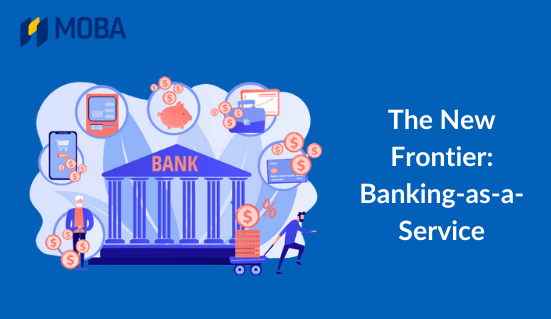With an estimated $7 trillion market opportunity and a growth rate of more than 25% annually for the next 3-5 years, Banking as a Service (BaaS) has progressed to the top of the strategic agenda for executives across industries. In financial services, BaaS platforms have arisen as the main element of open banking, in which companies provide more financial transparency options for account holders by offering their application programming interfaces (APIs) for third parties to generate new services.
With technological advances, fintech has been encroaching on market share traditionally belonging to banks and disrupting traditional banking systems – but by entering the BaaS space, tech-savvy legacy banks can convert this looming threat into an opportunity
What is banking-as-a-service?

BaaS is an end-to-end model that allows third parties to offer core financial services to their clients and builds products on top of the banking infrastructure by integrating with banks via APIs.
Here is an example
Imagine you are managing an airline brand. You are dealing with intense competition and hence would like to reinforce customer loyalty. So here’s what you determine to implement:
- Provide customized cards to your consumers
- Award loyalty points for each purchase
- Online loan for flight tickets
Now, these initiatives will instantly enhance sales and customer satisfaction. Furthermore, you can gain deep insights into customer buying habits to deliver more customized offers to clients.
Sounds easy enough. Until you find out that you need a banking license to be legally offering banking services to customers. Due to the systematic relevance of banks to the functioning of the economy, such a license is difficult to obtain. This is where you need the help of Banking as a Service
The bank’s system communicates via APIs and webhooks with that of the airline, permitting your users to access banking services directly through your airline’s website or app. Hence, with BaaS, pretty much any enterprise can become a banking provider with nothing but a few lines of code. That’s why BaaS is often referred to as white-label banking, as the banking services are delivered through the branded products of the non-bank.
How does banking-as-a-service work?

The Banking as a Service model begins with a fintech, or other third-party providers (TPP) paying a fee to access the platform. The bank connects its APIs to the TPP, thereby permitting access to the systems and information essential to develop innovative banking products or provide white label banking services.
In addition to getting ahead of the open banking opportunity, legacy institutions can also unlock new revenue streams by launching their own BaaS platform. The two key monetization strategies for Banking-as-a-Service involve charging users a monthly fee for access to the platform or charging a la carte for each service used.
Advantages of Banking as a Service

The banking as a service model has been revolutionary for the financial sector. Considering the enormous growth opportunities that it brings, it’s no wonder that 77% of banks are planning to invest in open banking initiatives for their commercial customers.
Banks
By sharing data with third-party financial institutions via BaaS, banks can now get new streams of revenue with providers’ commission fees. Partnering with third parties can also help banks access ready-made solutions without investing heavily in technological development. Instead, banks can do further investment and forecasts of profitability. Lastly, the two-way flow of user data in the system enables banks to not only acquire new customers but also obtain better insights into customer preferences.
Non-banks & Fintech
BaaS entitles third-party providers and non-banks to execute their financial solutions within tight timelines and reasonable budgets, without having to obtain a banking license. Moreover, they can leverage customer trust from banks to enlarge their customer base. Finally, collected customer insights when integrating with banks can be turned into innovative and customized services/products.
End customers
At the end of the day, customers are the real winners. As BaaS enables competition in financial services by enabling non-banks to offer core banking services, innovation gets a push. As a result, customers get to experience frictionless and innovative products. Speed, convenience and a broad selection of payment options are only some of the perks that BaaS platforms can add to the consumer experience.
Opportunities and challenges of BaaS in Vietnam

The COVID-19 epidemic has accelerated the digital transformation globally. More than half (57%) of consumers now prefer Internet Banking to traditional branch banking, up from 45% prior the pandemic. Another study shows that bank customers are turning to mobile apps more than any other channel to manage their accounts.
Furthermore, the State Bank, in Resolution No. 2655/QD-NHNN, sets a deadline of 2025 for the introduction of an Open Application Programming Interface Standard (Open APIs). This is the legal and standardized foundation for the BaaS wave boom in Vietnam, considerably altering the ecosystem’s economic model. It also implies that the BaaS market in Vietnam is still underdeveloped.
On the other hand, policies relating to Open APIs deal with challenges regarding cloud computing services and user data security, pressuring the banking and financial sector to assist and urge government agencies to develop clear policies and regulations to promote the implementation of BaaS.
With that being said, BaaS is indeed a rising trend in the financial industry and it’s only a matter of time before this model becomes a norm for banking. Yet, technology consulting is a must to identify the appropriate strategy and prepare sufficient IT capability to ensure a high probability of success. With 12+ years of experience in software development, KMS Solutions has provided numerous digital technology consulting for APAC enterprises and successfully delivered multiple software development projects for them. Don’t miss out on this opportunity to accelerate your business growth. Contact us now.







